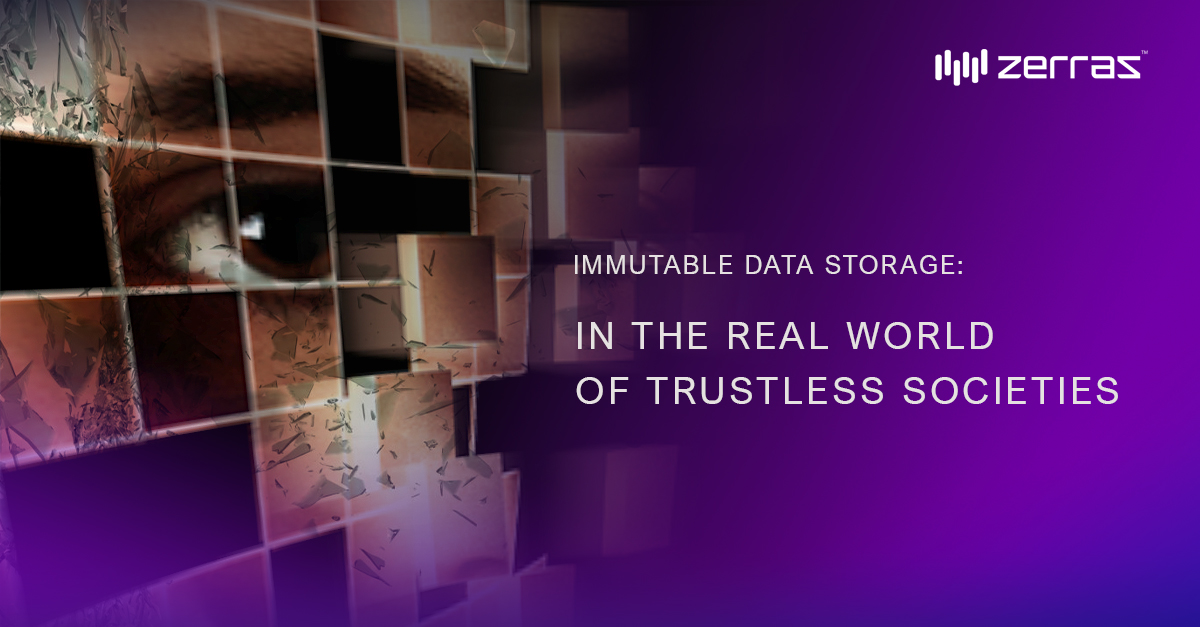Immutable Data Storage: In the real world of trustless societies
In today’s digital age, we are generating and storing more data than ever before. From social media posts and emails to scientific research and financial transactions, our world relies on the ability to store, access, and verify large amounts of data. Even AI and machines will need to store files in an offline manner. However, as the volume of unstructured cold data continues to grow, the need for long-term immutable data storage becomes increasingly important – especially the need to record data indefinitely without alteration in trustless societies and applications.
A trustless society is a theoretical concept that describes a society or application in which people can interact and transact with each other without the need for trust or intermediaries. This is often associated with the use of blockchain technology and cryptocurrencies, which allow for decentralized, peer-to-peer transactions that do not require the involvement of a trusted third party, such as a bank or government.
Immutable data refers to data that cannot be altered, deleted, or overwritten once it has been created. Like carving contract terms into a stone tablet, it cannot be altered without destroying the original tablet. This type of data is becoming increasingly important now, as it provides an extra layer of security and trust for critical data in the real world. Here are some reasons why immutable data is required in the future:
Rise of metaverses: Virtual and alternate spaces where people can interact, create, and transact with each other in real-time will be a part of societal norm as screens get bigger and cheaper. Metaversal applications relies heavily on the use of digital assets, which can take the form of virtual goods, virtual currency, and other types of digital property. By using immutable data, metaverses can ensure the integrity and authenticity of these digital assets. Immutable data can help prevent the creation of counterfeit or fraudulent virtual assets, which can have a significant impact in both real and virtual economies. In addition, immutable data can be used to establish provenance for digital assets, providing a clear record of ownership and transaction history. This is particularly important in the trade of assets like in the real world – where regulation, governance, and accountability still run true.
Trust and transparency: Immutable data provides an extra layer of trust and transparency for critical data. For example, in industries such as finance, healthcare, legal and the public sector, immutable data can enable trust between organizations and individuals, as it ensures that data cannot be tampered with or altered. With the rise of Central Bank Digital Currencies, tokenization of assets, privacy laws, censorship concerns, and zero-trust models, detailed audit trails will be required in the creation of the assets while providing historical evidence of transactions.
Compliance and regulatory requirements: Many industries have compliance and regulatory requirements that mandate the preservation and security of data. Immutable data provides a reliable way to ensure that data files remain unchanged to hold individuals and organizations accountable for fraudulent or illegal activities.
Security and data protection: Immutable data is crucial for protecting against data breaches and cyber-attacks. By having an offline master data copy that is unalterable and invulnerable to the environment, organizations can prevent data loss and reduce data replication and migration costs, while retaining the ability to easily access the data files from a master archive.
Data integrity and accuracy: Immutable data is essential for ensuring data integrity and accuracy. By preventing data from being altered or deleted, organizations can ensure that the data they rely on for decision-making is accurate and reliable. As generative AI and large language models produce text, images and other forms of unstructured data files, immutable data storage will be a required capability to store original works of authenticity.
Optical storage libraries and BDXL discs coupled with solid-state storage offer an ideal solution for the long-term storage of critical data, particularly unstructured data files -particularly unstructured data files that need to ensure evidence of truth. These storage options provide robust protection against accidental data loss, hardware failure, or cyber-attacks, making them an excellent choice for safeguarding master files or documents that must not be changed. Optical storage libraries are also immune to magnetic interference and do not suffer from tape degradation, making them a reliable random-access storage option for medical records or images, financial transactions, public records from government, legal evidence, and other critical data that must be preserved for an extended period. When data and its storage is at the end of its life, it requires much less cost, time, and energy to safely destroy the data than magnetic hard drives and tape.
In conclusion, long-term data storage and immutable data are essential for preserving valuable data, meeting regulatory requirements, ensuring business continuity, and fostering future innovation. As the amount of data, we generate continues to grow, the need for effective long-term data storage solutions and immutable data will become even more important. By investing in proper data storage solutions and preparing for data lifecycle requirements of the future, businesses and individuals can efficiently protect their critical data and ensure that it remains accessible, useful, and trustworthy for years to come.

